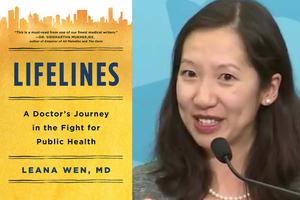Pro-Life Activist Takes on the Deeper Problems Surrounding Abortion
Mary Kate Knorr, founder of Feminae Vero, champions women’s health from a Catholic perspective.

Mary Kate Knorr is a pro-life leader who has worked on the state and federal levels of the fight against abortion. After serving as the executive director of Illinois Right to Life and as strategic director for Students for Life Action, she recently launched her own initiative called Feminae Vero. Feminae Vero aims to educate medical professionals, elected officials and especially women everywhere of the truth about women’s health. Founded on Catholic teaching and modern fertility science, Feminae Vero rejects artificial birth control as a catch-all solution to female health issues and seeks “to make life-affirming, solutions-oriented health care available for all women.” Knorr shared about her new mission Aug. 2 via email.
How did your work in the pro-life field make you want to switch gears to this kind of advocacy and education? Why is it important to extend the conversation around abortion to include women’s health?
Working in the pro-life movement made me realize two things: First, that the issue of abortion is not just a logic problem — it’s also a heart problem. I realized that if we truly want to win people over on the issue, it doesn’t simply call for convincing arguments or winning debates. It calls for transformation and conversion. And, second, I realized that we could not adequately address the abortion issue if we weren’t also addressing with veracity the false definition of “reproductive health care” that has been allowed to impress itself upon Americans. As has been the case so many times in history, Catholics are ahead on this issue. There are Catholic medical practices across the country using technologies that are authentically healing and restoring women’s reproductive health. These technologies are not being utilized by mainstream OB-GYNs, nor are they accessible for most women. This is why I believe we must extend this conversation, because victory over abortion requires authentic spiritual conversion (winning souls for Christ) and also requires that we define “reproductive health care” as what it actually is: restorative and healing, rather than damaging.
What are some of the misconceptions that women and their doctors have about female health?
The prime example of a medical misconception is the artificial hormonal birth control pill’s use for seemingly every female issue. Acne, period pain, excessive bleeding — you name it, and a doctor is likely to use the Pill to treat it. This has been so damaging, both to women and to our culture as a whole. Pope Paul VI was so clear in Humanae Vitae that such an abuse of the woman’s reproductive gift would mean immense fallout for society. His predictions have been profoundly accurate. Rise in teen sex, rise in out-of-wedlock pregnancy, rise in divorce — all of the above are, in part, an aspect of the fallout associated with mainstream birth control and legal abortion. But so often, you hear from mainstream doctors that there’s simply no option other than the pill (or, in some cases, abortion). This argument is categorically false, and in their defense, they simply don’t know any other way.
What are some of the “health-care norms” you would most like to change?
Mainstream use of the pill, as I mentioned, is absolutely on the list. Abortion as a response to pregnancy complications or certain genetic test results is another. In general, our culture approaches women’s reproductive gift as a burden or an illness. Nothing could be further from the truth. It comes with great challenges and mysteries, but this is true for so much in life. My organization uses the term “solutions-oriented health care” because we want to stress that the goal is to identify problems and seek real, authentic solutions — not Band-Aids. The pill and abortion are not sufficient approaches to treating reproductive and hormonal ailments. We absolutely must stop treating them as such.
What is your strategy for implementing these changes?
Feminae Vero’s mission stands upon a three-part philosophy: Serve, educate and evangelize. First, it’s our goal to serve women by addressing their immediate physical needs by gathering information about their symptoms and making a medical referral to a doctor in their area who has been vetted by us and is using some of the technologies I mentioned above. Then we intend to use this point of connection to do some basic educating on how their bodies are designed to work, what the reproductive cycle means for a woman’s health, and how the pill, Plan B, abortion and some other approaches have the potential to do harm. Third (and most importantly), once we’ve had the opportunity to build a relationship with these women, we invite them into a spiritual conversation. At that point, when they’ve expressed openness, we introduce how all of these biological truths reflect the truths of our Christian faith. As Thomas Aquinas said, “Grace builds on nature.” Our hope is that women’s hearts will be opened to a personal encounter with Jesus Christ.
How does your faith undergird your mission?
One of my struggles within the pro-life movement was that convincing people of the evils of abortion was not enough for me. I do believe that abortion should be illegal, but even more importantly than that, I want every woman (and man and child) to know Our Lord the way that I’ve come to know Our Lord. Winning a political argument is simply not enough for me. I want to win souls for Christ.
Why is it important that Feminae Vero utilize both science and faith?
Because they go hand in hand! There are so many misconceptions at play about the relationship between the Catholic faith and science. The reality is that, as Catholics, we embrace scientific exploration because it gives us a window into God’s truth and his plans for his creation! Science and faith, if lived and explored correctly, should aid one another and build upon each other. This is how Feminae Vero approaches both: as going hand in hand.
What are some of the Catholic sources that guide Feminae Vero’s principles?
Oh, so many! Humanae Vitae. Theology of the body. Devotion to Divine Mercy. The creation story. So many of the saints’ experiences in evangelization have fed into our philosophy of serving first, then educating and evangelizing. A friend of mine once said to me that “we don’t need to be feminists because we’re already Catholics.” While I understand the desire to adapt feminism, his words have always rung so true for me. Our faith is so rich with teaching and tradition that honors women, calls for healing and restoration, and demands truth over falsehood. Honoring Our Lady, healing through Divine Mercy, and the Lord’s command to Christians to bring truth into the world are at the heart of our faith tradition and also our mission at Feminae Vero. So, really, we simply have to look to the tradition of our faith. This is what we’ve been tasked with all along.
How can people support your mission?
People can support our mission by heading to our website at FeminaeVero.org.
- Keywords:
- mary kate knorr
- nfp awareness week
- feminae vero

















